
North Central Jurisdiction wrap-up: November 3, 2022
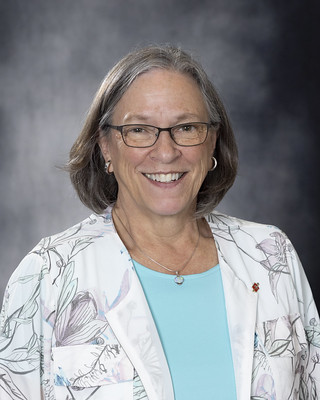 “The 2022 North Central Jurisdictional Conference has been filled with words of hope and acts of unity. We have heard words that express the belief that dry bones can, indeed, come alive! We have seen candidates for the episcopacy engage one another in prayer and support, not as rivals but as Christians open to the working of the Holy Spirit. We have shared in prayer and worship and raised our voices in song together. And we have felt the power of God’s presence move among and within us as United Methodist Christians. Although I am watching from afar in order to be closer to my hospice parents, I can feel the power of these moments. And I am encouraged. Difficult as these days have been for the Dakotas Conference, I believe God is not done with the United Methodist Church, and, in fact, has plans for us that we have yet to discover. “What we will be has not yet been revealed.” (1 John 3:2). Without a doubt, the spirit of this conference confirms that belief. Praise be to God!”
“The 2022 North Central Jurisdictional Conference has been filled with words of hope and acts of unity. We have heard words that express the belief that dry bones can, indeed, come alive! We have seen candidates for the episcopacy engage one another in prayer and support, not as rivals but as Christians open to the working of the Holy Spirit. We have shared in prayer and worship and raised our voices in song together. And we have felt the power of God’s presence move among and within us as United Methodist Christians. Although I am watching from afar in order to be closer to my hospice parents, I can feel the power of these moments. And I am encouraged. Difficult as these days have been for the Dakotas Conference, I believe God is not done with the United Methodist Church, and, in fact, has plans for us that we have yet to discover. “What we will be has not yet been revealed.” (1 John 3:2). Without a doubt, the spirit of this conference confirms that belief. Praise be to God!”
Words of hope and inspiration from Bishop Deborah Kiesey, interim bishop for the Dakotas Conference.
Identity in Christ and Odd Space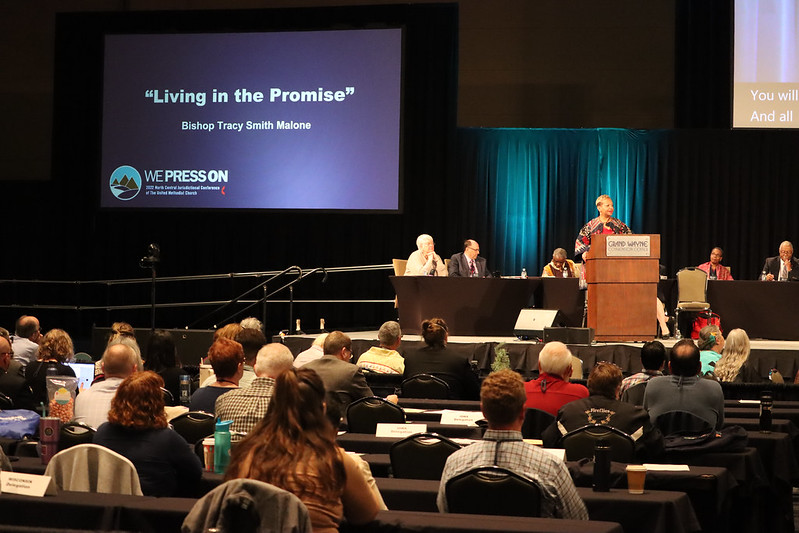 The sound of drumming called the North Central Jurisdictional Conference to worship on the second day of their gathering. It was a day of recognizing our diversity and unity, and one of centering ourselves in our identity in Christ. “On Christ the solid rock, all other ground is sinking sand” was the refrain Bishop Tracy Smith Malone echoed as she began her sermon. She went on to say, “Every day, we have a choice to make. Yes, we do every day…We have to remember, and we have to decide how we will reflect Christ.” She added, “There is a freedom and healing that comes from surrendering our lives to Christ.” She went on to invite us to live into the promise of 2 Corinthians 4: 7-18. “God’s glory is all around us. Yes, we are in the middle of a crisis, but we are also in the middle of an opportunity. God is about to birth something new. We have to look for God and see where the Spirit of God is at work!” Read more | View sermon video | View video of the entire service
The sound of drumming called the North Central Jurisdictional Conference to worship on the second day of their gathering. It was a day of recognizing our diversity and unity, and one of centering ourselves in our identity in Christ. “On Christ the solid rock, all other ground is sinking sand” was the refrain Bishop Tracy Smith Malone echoed as she began her sermon. She went on to say, “Every day, we have a choice to make. Yes, we do every day…We have to remember, and we have to decide how we will reflect Christ.” She added, “There is a freedom and healing that comes from surrendering our lives to Christ.” She went on to invite us to live into the promise of 2 Corinthians 4: 7-18. “God’s glory is all around us. Yes, we are in the middle of a crisis, but we are also in the middle of an opportunity. God is about to birth something new. We have to look for God and see where the Spirit of God is at work!” Read more | View sermon video | View video of the entire service
“Odd space” is how Bishop David Bard, president of the College of Bishops, described the times we live in as church and culture in his episcopal address. So how do we live in such a space? We are called to a larger heart, a capacious heart. A heart with a capacity to be spacious and gracious, and curious and creative. In this odd space, Bard posited, whatever is emerging in the future United Methodist Church, it needs to be genuinely rooted in our historic faith.
“Rooted in our historic Christian faith we know we have good news to share in Jesus Christ, good news that redemption is possible, forgiveness is possible, new life is possible, transformation is possible, beloved community is possible, justice is possible.” The bishop concluded that yes, this is odd space, but it is as odd as “a member of a minority group in the backwater reaches of a vast empire, executed for defying that empire, becomes the crucified and risen Lord. Toward this odd space, we press on.” Read more | View video
Election of third bishop
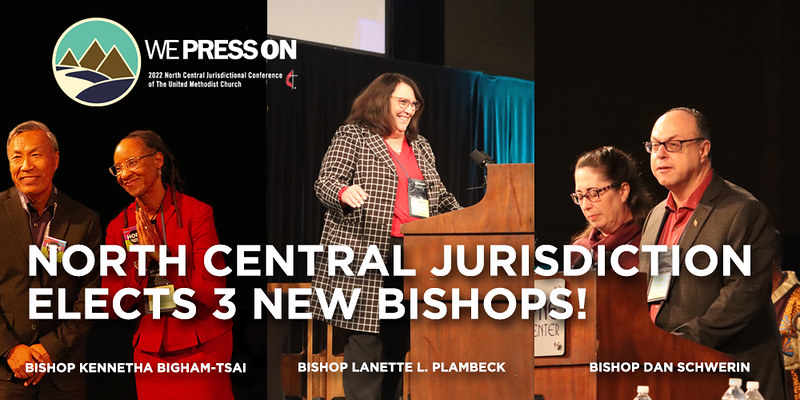 Rev. Dan Scherwin, Wisconsin, who was elected as the third and final election on the sixth ballot also spoke to our Christian identity. He gave thanks for his baptism, as it is there that we discover our reliance in Jesus Christ and how we discover each other and the newness before us. He said this moment depends on all of us. "As we step forward in our baptism call, all of us discover each other and a newness. Because as long as we have a relationship with Jesus Christ, we have a relationship with each other and deepen our relationship with God." Read more | View video
Rev. Dan Scherwin, Wisconsin, who was elected as the third and final election on the sixth ballot also spoke to our Christian identity. He gave thanks for his baptism, as it is there that we discover our reliance in Jesus Christ and how we discover each other and the newness before us. He said this moment depends on all of us. "As we step forward in our baptism call, all of us discover each other and a newness. Because as long as we have a relationship with Jesus Christ, we have a relationship with each other and deepen our relationship with God." Read more | View video
Beata Ferris, lay delegate for the Dakotas Conference, shared excitement about the elections. “My role as a lay delegate afforded me the opportunity to be in the room where it happens,” she said. "We are deeply engaged in conversation about how to assign our newly elected bishops along with the other bishops across the area."
Now the North Central Jurisdictional Episcopacy Committee will meet to discern the assignments of bishops to the nine episcopal areas. Rev. Sara Nelson, First UMC in Sioux Falls and clergy delegate and Beata Ferris, First UMC in Pierre, South Dakota, serve on the Episcopacy Committee.
“It is a privilege for me to serve as one of the clergy delegates to jurisdictional conference and to serve on the Committee on Episcopacy for the North Central Jurisdiction. It has been exciting to see how God is truly in the room,” said Nelson.
Nelson and Ferris are meeting each of the newly elected bishops. “Beata and I have already had the privilege of meeting with one of our newly elected bishops and hearing her dreams, and her excitement for how God is moving within her life, and her hopes and excitement for serving as a newly elected bishop. We are looking forward to meeting with the two other newly elected bishops later tonight and to go through the holy work of making assignments and we are excited to be a part of that process,” said Nelson.
The challenge of Christian nationalism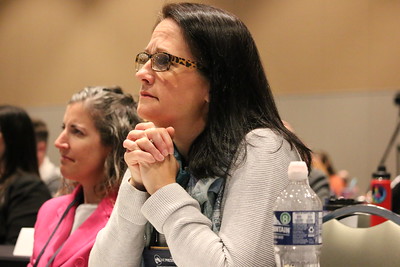 Identity in Christ was considered through the lens of Christian nationalism, racism, and white supremacy in a conversation led by Bishop David Bard of Michigan and Minnesota and Bishop Julius Trimble of Indiana. Bishop Trimble asked the body to consider, “where is our identity in relation to who Jesus was and who Jesus is” particularly as Christian nationalism is a dangerous conflation of theology and political ideology. After offering a framework on the intersection of racism, white supremacy, and Christian nationalism, all in the room were invited to gather in small groups to discuss how to help congregations have conversations about white supremacy and Christian nationalism.
Identity in Christ was considered through the lens of Christian nationalism, racism, and white supremacy in a conversation led by Bishop David Bard of Michigan and Minnesota and Bishop Julius Trimble of Indiana. Bishop Trimble asked the body to consider, “where is our identity in relation to who Jesus was and who Jesus is” particularly as Christian nationalism is a dangerous conflation of theology and political ideology. After offering a framework on the intersection of racism, white supremacy, and Christian nationalism, all in the room were invited to gather in small groups to discuss how to help congregations have conversations about white supremacy and Christian nationalism.
Rev. Rebecca Trefz, clergy delegate for the Dakotas Conference, said, “Acknowledgement and confession require us to be vulnerable but also open us to the healing, transforming power of the spirit.”
She expressed appreciation for times of learning and discussion on topics that are hard to discuss.
“I appreciate that we include these non-legislative times of learning and discussion at NCJ conference. They challenge us to wrestle deeply with hard things of our discipleship, but also equip us with tools to do that in our churches and conferences. We experienced that during the 2021 anti-racism conversation and expanded that learning and conversation to include Christian nationalism this year. We know having these conversations in our local context can be hard. But I also believe if our identity is rooted and anchored in the love of Christ and who we are in him, we can be brave enough to name these things, to admit we have blind spots, to acknowledge that there are systems of which we are a part of that have hurt people throughout history and continue to do so, and to want to live out Micah 6:8,” she said.
Rev. Paul Perez from the Michigan Conference and Rev. Annettra Jones from the Indiana Conference shared examples from all 10 NCJ conferences about what anti-racism work is being done, which they called glory sightings.
Highlighted in the Dakotas Conference were Canyon Lake United Methodist Church’s efforts to learn, discern, and pray about how to help honor the children who died decades ago while attending the Rapid City Indian School (RCIS). Also featured was Renuevo a Hispanic Ministry at Sioux Falls Sunnycrest UMC, Mitchell Downtown First UMC and Plankinton, UMC.
Jones left the body with the message to fund the work. She reminded us that our budgets are theological documents that reveal what we truly support. Consultants, staff, and training need the funds to be effective.
Perez reminded the body that anti-racism work is gospel work. The work will take generations to complete, but it is our task to find what we can do and to pass the work on to the next generation.
Celebration of the ministry of Bishops Sally Dyck, Laurie Haller, and Bruce Ough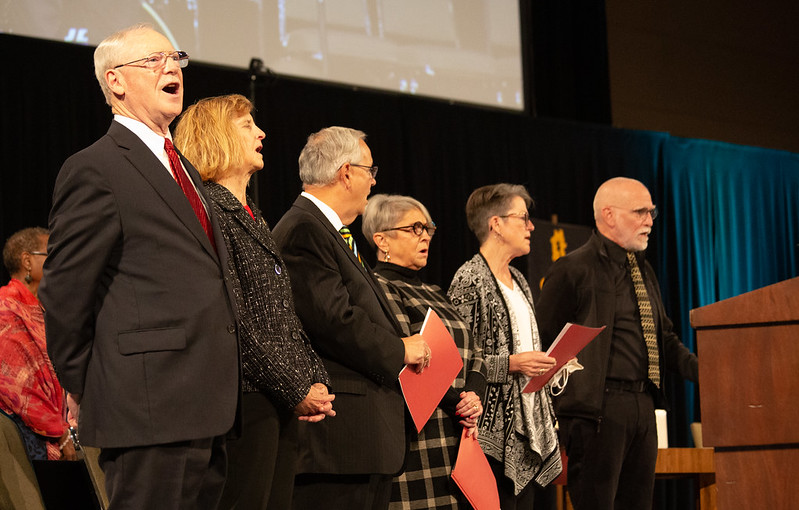 The day ended with the celebration of the retirement of three bishops. Bishop Sally Dyck and Bishop Bruce Ough had officially retired at the end of 2020, and Bishop Laurie Haller, Iowa, who is retiring at the end of 2022, each offered reflections and were given gifts and thanks from the Committee on Episcopacy. The spouse of each bishop read a scripture chosen by the retiring bishop: Ephesians 3:14-21 for Bishop Ough, Philippians 4:4-9 for Bishop Haller, and Romans 12: 1-2, 9-21 for Bishop Dyck. On behalf of the College and Council of Bishops, Bishop David Bard thanked them for their deep commitment to Jesus Christ and to the church. Read more
The day ended with the celebration of the retirement of three bishops. Bishop Sally Dyck and Bishop Bruce Ough had officially retired at the end of 2020, and Bishop Laurie Haller, Iowa, who is retiring at the end of 2022, each offered reflections and were given gifts and thanks from the Committee on Episcopacy. The spouse of each bishop read a scripture chosen by the retiring bishop: Ephesians 3:14-21 for Bishop Ough, Philippians 4:4-9 for Bishop Haller, and Romans 12: 1-2, 9-21 for Bishop Dyck. On behalf of the College and Council of Bishops, Bishop David Bard thanked them for their deep commitment to Jesus Christ and to the church. Read more
Watch this 15-minute interview with Bishops Ough and Dyck as they reflect on their ministry.
Watch this 8-minute conversation with Bishop Haller on her retirement and ministry.
Resources
Access articles
View videos
View photos
Listen to audio files